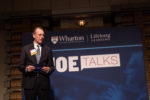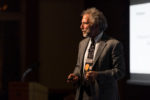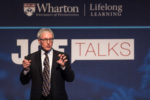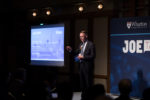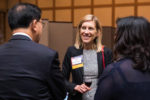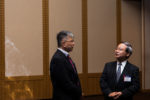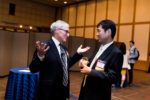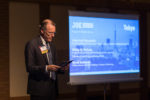
TOKYO
WEDNESDAY, OCTOBER 10
Imperial Hotel
1-1, Uchisaiwai-Cho 1-Chome
Chiyoda-Ku, Tokyo 100-8558,
Japan
7:00 PM – 7:30 PM
Welcome Reception
7:30 PM – 8:30 PM
Faculty Program
8:30 PM – 9:30 PM
Continued Networking and Cocktail Reception

Tokyo
WEDNESDAY, OCTOBER 10
Imperial Hotel
1-1, Uchisaiwai-Cho 1-Chome
Chiyoda-Ku, Tokyo 100-8558,
Japan
7:00 PM – 7:30 PM
Welcome Reception
7:30 PM – 8:30 PM
Faculty Program
8:30 PM – 9:30 PM
Continued Networking and Cocktail Reception
Now, More Than Ever, the world needs Wharton.
Join us as we celebrate More Than Ever, Wharton’s campaign, and hear an all-star lineup of Wharton professors present their latest research in a dynamic format. Enjoy conversations with industry thought leaders, alumni, and faculty at a reception following the program.
#MoreThanEver
Featured Faculty
John Paul MacDuffie
Professor of Management
Fast-Moving Vehicle & Mobility Ecosystems: How Much Disruption and How Soon?
The transformation of the mobility sector — encompassing the automotive sector and new entrants from the technology sector but also the providers of mobility services — has captured the attention of established incumbents, aspiring entrepreneurs, analysts/consultants, policy makers, and activists. Mobility of individuals and goods underpins a key part of global GDP; provides livelihoods and boosts convenience and quality of life; generates externalities (e.g. congestion; greenhouse gas emissions; energy dependence; injuries/deaths); and affects us all daily. This talk gives particular attention to the distinctive societal expectations placed upon those who build and operate motor vehicles —which are fast-moving, heavy objects that can kill people and destroy property while operating entirely in public space. These expectations will affect the pace of the transition from the current human, and carbon fuels-based mobility system to the autonomous and electric future system that so many now eagerly (or fearfully) anticipate. He will also emphasize the challenges facing both incumbent and new entrant firms as waves of disruptive technologies and new business models arise — and the likelihood that automotive and tech firms will need to collaborate, less out of preference than necessity.
John Paul MacDuffie
Professor of Management
Fast-Moving Vehicle & Mobility Ecosystems: How Much Disruption and How Soon?
The transformation of the mobility sector — encompassing the automotive sector and new entrants from the technology sector but also the providers of mobility services — has captured the attention of established incumbents, aspiring entrepreneurs, analysts/consultants, policy makers, and activists. Mobility of individuals and goods underpins a key part of global GDP; provides livelihoods and boosts convenience and quality of life; generates externalities (e.g. congestion; greenhouse gas emissions; energy dependence; injuries/deaths); and affects us all daily. This talk gives particular attention to the distinctive societal expectations placed upon those who build and operate motor vehicles —which are fast-moving, heavy objects that can kill people and destroy property while operating entirely in public space. These expectations will affect the pace of the transition from the current human, and carbon fuels-based mobility system to the autonomous and electric future system that so many now eagerly (or fearfully) anticipate. He will also emphasize the challenges facing both incumbent and new entrant firms as waves of disruptive technologies and new business models arise — and the likelihood that automotive and tech firms will need to collaborate, less out of preference than necessity.

Philip M. Nichols
Joseph Kolodny Professor of Social Responsibility in Business
Professor of Legal Studies & Business Ethics
Protecting the Algorithm
The world is experiencing the beginning of yet another technology revolution, one in which machine algorithms will replace many decisions currently made by humans. Revolutions in data gathering, storage, and manipulation have made this possible. Almost all of the critical analysis of the impending algorithmic revolution has focused on privacy issues that accompany the use of such data, while a small amount has discussed unintended discrimination. No attention has been paid to a problem potentially just as serious: the intentional corruption of underlying algorithms. Even a slight distortion of algorithms underlying business decisions could move millions or billions of dollars in unproductive ways. This talk explains the problemusing pharma and medical devices as illustrations. Professor Nichols proposes means of protecting the integrity of algorithms that will be simple, if implemented now, but may become more difficult to implement as the revolution unfolds.

Philip M. Nichols
Joseph Kolodny Professor of Social Responsibility in Business
Professor of Legal Studies & Business Ethics
Protecting the Algorithm
The world is experiencing the beginning of yet another technology revolution, one in which machine algorithms will replace many decisions currently made by humans. Revolutions in data gathering, storage, and manipulation have made this possible. Almost all of the critical analysis of the impending algorithmic revolution has focused on privacy issues that accompany the use of such data, while a small amount has discussed unintended discrimination. No attention has been paid to a problem potentially just as serious: the intentional corruption of underlying algorithms. Even a slight distortion of algorithms underlying business decisions could move millions or billions of dollars in unproductive ways. This talk explains the problemusing pharma and medical devices as illustrations. Professor Nichols proposes means of protecting the integrity of algorithms that will be simple, if implemented now, but may become more difficult to implement as the revolution unfolds.

David Reibstein
William Stewart Woodside Professor
Professor of Marketing
Nation Branding
Companies invest in brands because it makes good economic sense. They garner a return through either increased prices or increased volume as their brand improves. The same can be expected of nation brands. Professor David Reibstein recently completed a global study of over 16,000 respondents, capturing their perceptions of 60 nations on 65 attributes. He used these to form a better understanding of the brand of nations, assessing how those brands help contribute to their economic prosperity. The brand has an impact on tourism, foreign trade, and foreign direct investment—all key components of GDP. Professor Reibstein will engage the audience in the discussion of the relevance of Asian nation brands and the interplay of geopolitics, economics, social impact investing, innovation, and entrepreneurship.

David Reibstein
William Stewart Woodside Professor
Professor of Marketing
Nation Branding
Companies invest in brands because it makes good economic sense. They garner a return through either increased prices or increased volume as their brand improves. The same can be expected of nation brands. Professor David Reibstein recently completed a global study of over 16,000 respondents, capturing their perceptions of 60 nations on 65 attributes. He used these to form a better understanding of the brand of nations, assessing how those brands help contribute to their economic prosperity. The brand has an impact on tourism, foreign trade, and foreign direct investment—all key components of GDP. Professor Reibstein will engage the audience in the discussion of the relevance of Asian nation brands and the interplay of geopolitics, economics, social impact investing, innovation, and entrepreneurship.
Moments from More Than Ever Tokyo 2018
Location
Peacock West Ballroom
Imperial Hotel Tokyo
1-1, Uchisaiwai-Cho 1-Chome, Chiyoda-Ku, Tokyo 100-8558, Japan










